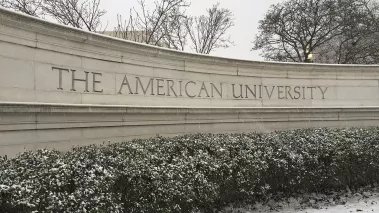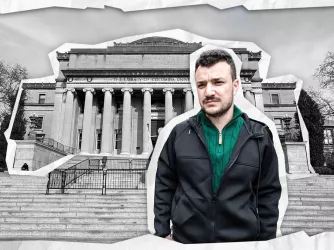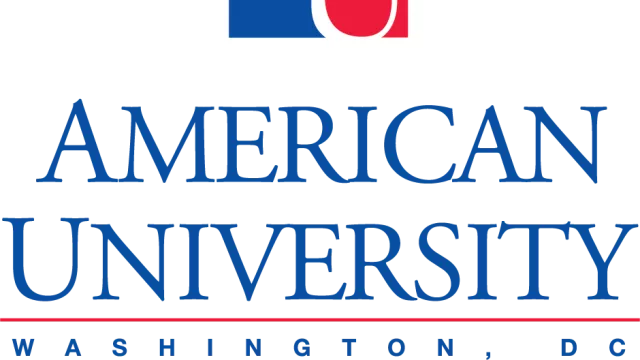Table of Contents
AU déjà vu: American University violates student speech rights for third time in a year

Wikimedia Commons
American University is investigating student speech — again. FIRE wrote the D.C.-area university for the third time in less than a year today to remind American it must honor its clear commitments to student expression.
American announced the latest investigation yesterday after “Black people suck” was reportedly written on a library whiteboard. Soon after, American unmasked the anonymous speaker and now says it’s deciding whether the message violates the university’s code of conduct and if the student should be punished.
But because American makes strong affirmative commitments to “protecting free expression for all members of its community,” the university cannot publicly announce a speech-chilling investigation or punish protected speech. However offensive the anonymous message may be to some, and because it was not targeted or pervasive enough to constitute unlawful discriminatory harassment, it remains fully protected by the university’s policies. In short, there’s nothing to investigate.
As we explained to American today, “merely offensive expression, without more, fails to approach the legal definition for discriminatory harassment, and investigating students for protected speech is not appropriate.” That definition was laid out by the Supreme Court in Davis v. Monroe County Board of Education. Student expression constitutes actionable discriminatory harassment only when it is (1) unwelcome, (2) discriminatory on the basis of a protected status, and (3) “so severe, pervasive, and objectively offensive, and that so undermines and detracts from the victims’ educational experience, that the victim-students are effectively denied equal access to an institution’s resources and opportunities.”
This typically requires extreme and repetitive behavior targeted at an individual based on a protected class — conduct so serious it would prevent a reasonable person from receiving his or her education. A single untargeted message on a whiteboard, without more, fails to meet this well-established legal standard.
This feels like déjà vu for us at FIRE, after having just written American in December and, before that, in July. Reminding American of its commitment to free expression has become a quarterly routine for FIRE.
In December, we told American that its requirement that student journalists fill out an online form for official approval to interview university sources violates the right to press freedom on campus.
Students should be aware that the university is willing to ignore its promises in the face of any outside pressure.
And last July, we wrote American after its investigation of eight law students for expressing pro-choice views in a private class group-chat on the platform GroupMe that offended a pro-life student. At the time, we warned American of the immense chilling effect of investigations into protected speech. American dropped the investigation in that case. But here it is again, ignoring our warnings, and investigating expression that its free speech promises prevent it from punishing.
One of the law students investigated last time, Daniel Brezina, told FIRE then that the chilling effect almost instantly silenced him and many of his classmates, who no longer felt comfortable having discussions in their GroupMe chat and now refrain from using the forum for discussions of any kind. “If American doesn’t commit to changing the way it handles these investigations, other students will still have to fear being investigated for pure speech,” he said.
In theory, American’s commitment to free expression should be enough to explain why the university can’t take action against protected expression. We told American that like the First Amendment at public schools, free speech commitments are “designed to avoid these ends by avoiding these beginnings.”
But not at American. Students should be aware that the university is willing to ignore its promises in the face of any outside pressure.
We asked American to end its investigation without punishing the student who wrote the whiteboard message. The university must also recommit to protecting free expression — and mean it — to ensure that its students can freely express themselves on campus.
FIRE defends the rights of students and faculty members — no matter their views — at public and private universities and colleges in the United States. If you are a student or a faculty member facing investigation or punishment for your speech, submit your case to FIRE today. If you’re a faculty member at a public college or university, call the Faculty Legal Defense Fund 24-hour hotline at 254-500-FLDF (3533). If you’re a college journalist facing censorship or a media law question, call the Student Press Freedom Initiative 24-hour hotline at 717-734-SPFI (7734).
Recent Articles
FIRE’s award-winning Newsdesk covers the free speech news you need to stay informed.

Trump administration’s reasons for detaining Mahmoud Khalil threaten free speech

VICTORY! 9th Circuit rules in favor of professor punished for criticizing college for lowering academic standards

Intimidating abridgments and political stunts — First Amendment News 461



